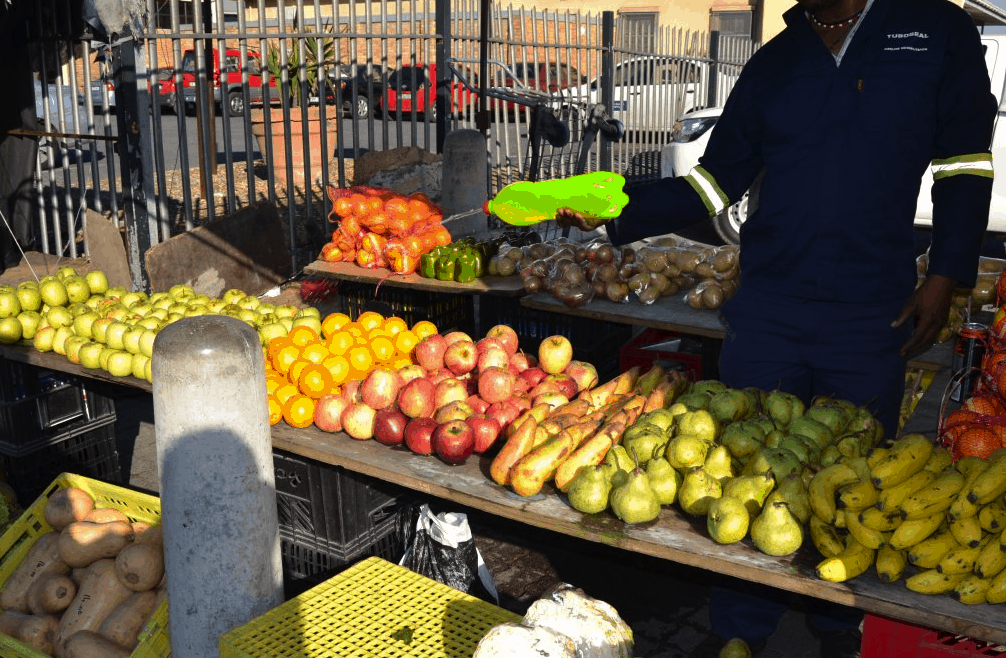
Will informal sector workers be covered by the safety net? Photo credit: Sustainable Livelihoods Foundation
On Monday evening, when President Ramaphosa announced a 21-day national lockdown to disrupt the spread of COVID-19, he also announced a set of interventions to “cushion our society” against the economic and human consequences of the impending lockdown. These interventions include a Solidarity Fund financed mainly by voluntary donations, a Temporary Employee Relief Scheme (TERS) for employees of companies in distress, and a tax subsidy for low-income private sector workers.
These and other mitigation measures are necessary and welcome. But there is a sense that the government is more concerned with protecting the economy (R3 billion of funding for vulnerable firms from the Industrial Development Corporation (IDC)) than protecting the wellbeing of the most vulnerable people (just R150 million of seed capital from the government for the Solidarity Fund).
Will informal sector workers be covered by the safety net?
In his speech the President mentioned business, companies, firms, SMEs and the private sector 35 times. He mentioned the informal sector just once: “A safety net is being developed to support persons in the informal sector, where most businesses will suffer as a result of this shutdown.” The Rupert and Oppenheimer families each donated R1 billion towards this safety net, “to assist small businesses and their employees”. But the reality is that the most vulnerable working-age adults are unemployed, self-employed, students, or working in precarious employment in the service sector (cleaners, waitrons, car guards, etc.). Most have no access to social grants or the Unemployment Insurance Fund (UIF). Will these people be reached by the COVID-19 safety net?
Domestic workers and seasonal farm workers, among others, will effectively become unemployed during the lockdown. Some employers will do the right thing and pay their workers for the days they are unable to work in the coming weeks, but many will not. With reduced income and no meals at school for their children to supplement meals at home (see below), the food security and nutrition of all family members will certainly suffer.
The President asked South Africans not to act “in their own selfish interests” during this crisis. But tougher action is called for. Some firms are already being investigated for hiking prices to profiteer from panic buying. All employers must be compelled to continue employing workers on full pay during the lockdown, and must not be allowed to either fire workers or leave them sitting at home with no pay. Employers that genuinely struggle to cover wage costs should receive assistance from the IDC and TERS. Employers that can afford to pay their workers but choose not to do so should be reported for non-compliance, prosecuted, fined and ordered to pay compensation.
Children
The President did not mention children once in his speech on Monday. 12 million children receive the Child Support Grant every month. We know that the CSG is not sufficient to meet the child’s nutritional needs. One in four children in South Africa are already malnourished. This statistic shames us, as an upper-middle-income country, at the best of times. COVID-19 threatens to make it even worse.
More than 9 million schoolchildren from poor families receive meals every school day. With all schools in South Africa now closed, that vital source of food has stopped indefinitely. In the Western Cape, the Peninsula School Feeding Association responded by raising additional funds so that their food handlers can prepare a free nutritious daily lunch for 4,200 children at community kitchens around Cape Town. This is a commendable response, but it will reach only a tiny fraction of needy children, in a relatively privileged metropolitan area.
What more should be done? The National School Nutrition Programme could continue to provide meals to poor children and their families throughout the country, either for collection from schools or served from mobile kitchens located temporarily in disadvantaged communities. The Department of Social Development could authorise a double payment of social grants in April, to boost the purchasing power of millions of families who depend on these grants to supplement their inadequate incomes – which in many cases will fall to zero income in the coming weeks.
Emergency Hardship Fund
The Solidarity Fund is necessary and will make some difference. But it is not enough. It has too many objectives – “focus efforts to combat the spread of the virus, help us to track the spread, care for those who are ill and support those whose lives are disrupted” – and not enough money – just R150m from Government.
A designated Emergency Hardship Fund is needed that will deliver an effective and guaranteed safety net for those whose livelihoods will be cut off during the lockdown. Instead of putting in seed money and soliciting donations, the government must guarantee to replace the lost income of all individuals who face the prospect of “no work no pay” at least until Friday 17 April.
Will this be expensive? Of course. But what is the cost of not putting such an emergency safety net in place? Household food insecurity and child malnutrition will rise. Poverty will rise. We will all lose.
related Articles
What would an anti-hunger budget have looked like?
Dr Busiso Moyo is a postdoctoral researcher with Union Against Hunger (UAH) founder-member, the DSTI-NRF Centre of Excellence in Food…
Union Against Hunger: Academia, civil society join forces to combat a ‘slow...
The Union Against Hunger is a coalition of forces from academia and civil society. Photo Alaister Russell/CoE-FS. The recently launched…
Black South Africans, in particular, face chronic and seasonal hunger
Prof Stephen Devereux is a Principal Investigator with the CoE-FS. Photo Icon Media Productions/CoE-FS. At the 5th International Social Justice…



